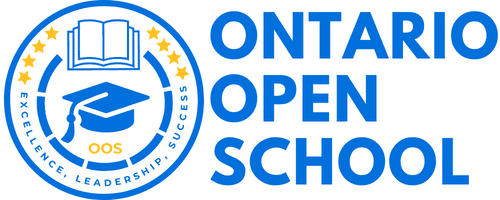- info@ontarioopenschool.com
- 647-494-4499
-
Unit 100 - 29 Gervais Drive, North York, ON.
M3C 1Y9
Copyright 2024 Ontario Open School Inc. All Rights Reserved.
This course gives students the opportunity to develop the skills, knowledge, and habits that will support them in their education and career/life planning. Students will learn about global work trends, and seek opportunities within the school and community to expand and strengthen their transferable skills and their ability to adapt to the changing world of work. On the basis of exploration, reflective practice, and decision-making processes, students will make connections between their skills, interests, and values and their postsecondary options, whether in apprenticeship training, college, community living, university, or the workplace. They will set goals and create a plan for their first postsecondary year. As part of their preparation for the future, they will learn about personal financial management – including the variety of saving and borrowing tools available to them and how to use them to their advantage – and develop a budget for their first year after secondary school.
Unit Order | Unit Name | Suggested Time |
|---|---|---|
| Unit 1 | Finding a Job Students already have a range of skills, interests and experiences that make them employable, the challenge is finding just the right match between their current profile and employment that is available. In this unit, students analyze current strengths and interests. They then discuss what strategies they might employ right now to become more competitive in the job market. Students discuss what to expect, in terms of their rights and responsibilities, if they get a job. Finally, students go through strategies for résumé and cover letter writing, approaching employers with or without job ads, interviewing, and other skills prerequisite to the job hunt. | 16 hours |
| Unit 2 | Taking the Reins While students might be employable now, they might not yet be in a position to go after their dream career. That might take some more schooling, experience or other skills. Students are provided with an overview in this unit of a wide range of educational opportunities available to them beyond secondary school. Students discuss types of jobs available in a number of different sectors, and some of the professional organizations that regulate them. Then, students analyze one interesting possibility—that of entrepreneurship, or being their own boss. | 17 hours |
| Unit 3 | Future Career Students now have a sense of their skills and interests, they have identified one or more careers that they might like to have in the future, and they’ve been presented with a variety of opportunities available to them after high school to get there. Where do they begin? This unit is about taking what students know about themselves and about what is available and making a plan. The unit goes over planning a path for education, job experience, and acquiring skills that will make them competitive. They discuss the virtues of, and strategies for, networking both in person and on the web. Finally, there is a section all about the more realistic aspects of the job hunt—job futures analysis, what to do in the case of unemployment, and strategies for planning alternate career paths without compromising their primary goals. | 17 hours |
| Final Evaluation 30% | Final Project Final Exam
| 3 hours 2 hours |
| Total | 55 Hours |
A wide variety of instructional strategies are used to provide learning opportunities to accommodate a variety of learning styles, interests and ability levels. These strategies include, but are not limited to:
| Course Specific | Language | Collaborative |
|
Direct teaching Teaching notes Work and tasks sheets Homework Independent reading Independent study Problem solving Information Analysis Research Portfolio Reflection Presentation Decision making Group Assignments Brainstorming Diagrams Problem-based learning Peer-evaluation Self-evaluation |
Oral presentation
Class Discussion Small group discussion Teacher-student conferencing Peer-evaluation Personal response notes Reading and answering questions Socratic Dialogue |
Cooperative learning Peer-evaluation Brainstorming Group discussion Student-teacher conferencing |
Purpose
The primary purpose of assessment is to improve student learning. Assessment relates directly to the expectations for the course.
A variety of assessments for and as learning are conducted on a regular basis to allow ample opportunities for students to improve and ultimately demonstrate their full range of learning and for the teacher to gather information to provide feedback. Assessment tasks relate to the success criteria set out in lesson plans. Success criteria allow students to see what quality looks like.
Evaluation is the process of judging the quality of student work in relation to the achievement chart categories and criteria and assigning a percentage grade to represent that quality. Evaluation is based on gathering evidence of student achievement through:
Assessment for Learning – we provide feedback and coaching. Assessment FOR Learning is the process of seeking and interpreting evidence for the use of learners and their teachers to decide where the learners are in their learning, where they need to go, and how best to go there.
Assessment as Learning – we help students monitor progress, set goals, reflect on their learning
Assessment AS Learning is the process of the explicit fostering of students’ capacity over time to be their own best assessors, but teachers need to start by presenting and modeling external, structured opportunities for students to assess themselves.
Assessment of Learning – we use assessments to provide evaluative statements about student achievement. Assessment OF Learning is the assessment that becomes public and results in statements of symbols
(marks/grades/levels of achievement) about how well students are learning. It often contributes to pivotal decisions that will affect students’ future.
ASSESSMENT TOOLS
Strategies for Assessment and Evaluation of Student Performance
| 70% | Units | Duration | Expectation | AFL | AAL | AOL | Assessed Categories | |||
| K
25% |
I
25% |
C
25% |
A 25% |
|||||||
| A | 15 hours | A1 – A3 | Discussion
Worksheet Personality/learning style test |
Skills Assessment
SMART Goals |
Personal Life Plan | x | x | x | x | |
| B | 15 hours | B 1- B3 | Homework
Discussion Transferable skills responses |
Reflective Journal
Skills Evaluation |
Unit Test
Reflection Paper Student – Teacher Conferencing
|
x | x | x | x | |
| C | 25 hours | C 1- C3 | Discussion | Student-Teacher Conferencing
Portfolio Reflection |
Interview response Questions
Culminating Portfolio
|
x | x | x | x | |
| 30% | Final Evaluation | A1-C3 | Final Project & Final Exam | x | x | x | x | |||
Resources
Growing Success: Assessment, Evaluation and Reporting in Ontario Schools (2010)
http://www.edu.gov.on.ca/eng/policyfunding/growSuccess.pdf
The Ontario Curriculum Grades 9 and 10 Guidance and Career Education
http://www.edu.gov.on.ca/eng/curriculum/secondary/guidance910currb.pdf
Unit 1
How to Write a SMART Goal
https://www.youtube.com/watch?v=1-SvuFIQjK8
President Obama’s Message for America’s Students
https://www.youtube.com/watch?v=8ZZ6GrzWkw0
Skills Profiler
https://www.careerinfonet.org/skills/default.aspx?nodeid=20
Learning Styles
http://www.duarte.com/blog/do-learning-styles-teach-us-anything/
Multiple Intelligences
https://empoweryourknowledgeandhappytrivia.wordpress.com/2015/10/30/multiple-intelligence-chart/
Multiple Intelligence Test
https://mypersonality.info/test-mi/
Unit 2
Six Destinations Career Choices
https://www.youtube.com/watch?v=O4SG2i1iMBs
Talks to help you find the right job
http://www.ted.com/playlists/220/7_talks_to_help_you_find_the_r
Career Test
http://www.yourfreecareertest.com/
Time Management
http://www.studygs.net/timman.htm
10 Tips to Effective & Active Listening Skills , by iamnext.com
Beyond Intractability.com , I-Messages and You-Messages
About.com: How to Listen & Retain , Listening skills for student
Unit 3
Young Workers’ Rights
https://www.labour.gov.on.ca/english/atwork/youngworkers.php
Subway interview tips
https://www.job-applications.com/subway-job-interview-tips/
Interview dos and don’ts
Grading
Weighting of categories
| Knowledge/Understanding | Thinking/Inquiry | Communication | Application |
| 25% | 25% | 25% | 25% |

Course Grade | Grade 10 |
|---|---|
Course Code | GLC2O |
Course Category | Guidance and Career Education |
Course Type | Open |
Course Delivery | Online |
Course Duration | 8hrs |
Course Credit | 0 |
Copyright 2024 Ontario Open School Inc. All Rights Reserved.
